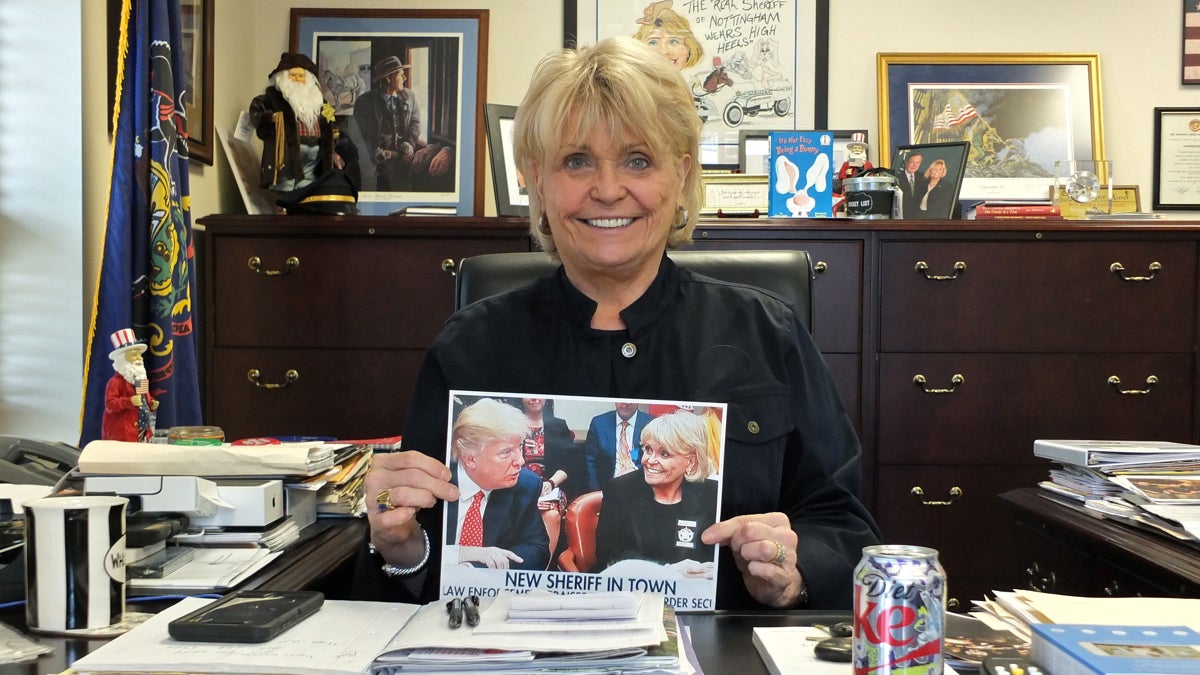Sheriff who met with President Trump feels he ‘respects’ law enforcement
Listen
Sheriff Carolyn "Bunny" Welsh holds up a picture from her meeting with President Donald Trump on February 7, 2017. (Laura Benshoff/WHYY)
President Donald Trump recently met with ten sheriffs from across the country to hear their public safety concerns. The first person he turned to was Chester County Sheriff Carolyn “Bunny” Welsh.
Trump made a point of courting law enforcement during his campaign. Now in office, Welsh and the county’s top prosecutor say Trump’s actions on law enforcement policy will have a material impact on how they do their jobs.
Feeling more respect
Welsh, the first woman elected sheriff of the suburban Philadelphia County, has been a booster for the president since he was one of more than a dozen Republicans candidates.
After meeting with him at the sheriff’s roundtable, she said it felt refreshing to be heard by the country’s highest administrator.
“The overall feeling was a good one when the sheriffs left that room, because it was a feeling that they have not had at any level of law enforcement, and that was respect,” she said.
After meeting with the sheriffs, Trump instructed Attorney General Jeff Sessions to create a task force focused on three things: illegal immigration, drug trafficking and violent crime.
While the recommendations from that task force are a long way off, Welsh said she hopes the President will allocate more money for law enforcement training and renew access to decommissioned military equipment.
“Maybe ten years ago, I had two deputies shot doing an eviction,” she said, reaching back in time for an example. After shooting the officers, the evicted man barricaded himself inside.
“He had high powered rifles and we had a deputy that was trapped,” Welsh said. “We had to borrow a Bearcat [an armored truck] from Montgomery County to get him out.”
President Barack Obama restricted police access to surplus military equipment, in response to how police in Ferguson, Missouri used surplus vehicles to quell protests in 2014.
Prosecutorial firepower
People who prosecute crimes in Chester County are excited about having a different kind of firepower to go after drug traffickers.
Over the last eight years, District Attorney Tom Hogan said federal prosecutors pursued fewer drug crimes in this county, leading to shorter sentences for drug dealers.
“One, the federal courts still have mandatories, which we don’t anymore,” he said. “So there would be a five year mandatory for dealing heroin.”
The Pennsylvania supreme court struck down most automatic minimum sentences in 2015, but judges still have discretion over sentence length. Federal prosecutions for drug crimes still carry mandatory minimums.
During the Obama administration, the Department of Justice policy called “Smart on Crime” pivoted away from going after street-level dealers and focused more on large-scale drug distribution networks, according to Acting United States Attorney for the Eastern District of Pennsylvania Louis Lappen. The premise is to divert non-violent offenders from an overcrowded prison system, and “bolster crime prevention and reentry efforts,” according to DOJ documents.
According to non-profit Marshall Project, the new attorney general has a number of routes to change sentencing guidelines.
Chester County is one of the wealthiest counties in Pennsylvania, known for its pricey housing and picturesque farmland — correspondingly, it has a lower rate of drug violations than counties closer to Philadelphia.
Still, Hogan said he believes more could be done to go after local drug distribution networks if greater federal support and cooperation were present.
“Don’t make that judgment until the facts are out.”
Mandates – and staff changes – dictated by the White House may take months or years to change practices. For now, the biggest change for law enforcement is a feeling of more support, said Welsh.
“I looked at different circumstances over the last eight years, and it seemed as if whenever there was a judgement call, they were quick to judge the law enforcement.”
She said public outrage – and protests – following police-involved shootings put law enforcement on the defensive.
Under the Obama Administration, the Justice Department ramped up investigations and penalties against law enforcement agencies found to have a pattern of civil rights complaints.
Welsh said the investigations themselves aren’t bad, but feeling that officers were presumed guilty is.
“When the facts come out, sometimes there are officers who have made mistakes,” she said. “But don’t make that judgment until the facts are out,” she said.
Under Trump, Welsh said she hopes people won’t jump to the conclusion that all police under investigation are “bad apples.”
Correction: This story was updated to more accurately reflect changes to Pennsylvania’s sentencing laws.
WHYY is your source for fact-based, in-depth journalism and information. As a nonprofit organization, we rely on financial support from readers like you. Please give today.




